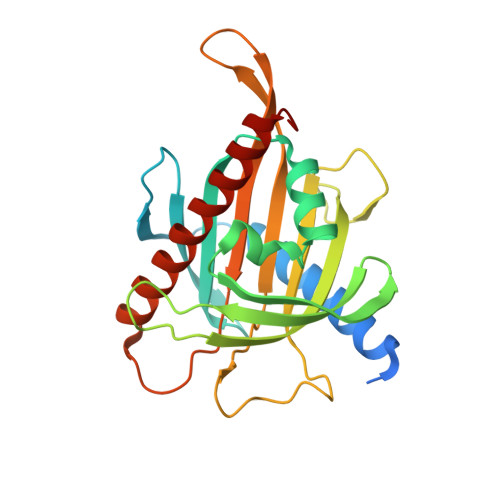Silkworm carotenoprotein as an efficient carotenoid extractor, solubilizer and transporter.
Sluchanko, N.N., Slonimskiy, Y.B., Egorkin, N.A., Varfolomeeva, L.A., Faletrov, Y.V., Moysenovich, A.M., Parshina, E.Y., Friedrich, T., Maksimov, E.G., Boyko, K.M., Popov, V.O.(2022) Int J Biol Macromol 223: 1381-1393
- PubMed: 36395947
- DOI: https://doi.org/10.1016/j.ijbiomac.2022.11.093
- Primary Citation of Related Structures:
7ZTQ, 7ZTR, 7ZTU - PubMed Abstract:
Found in many organisms, water-soluble carotenoproteins are prospective antioxidant nanocarriers for biomedical applications. Yet, the toolkit of characterized carotenoproteins is rather limited: such proteins are either too specific binders of only few different carotenoids, or their ability to transfer carotenoids to various acceptor systems is unknown. Here, by focusing on a recently characterized recombinant ~27-kDa Carotenoid-Binding Protein from Bombyx mori (BmCBP) [Slonimskiy et al., International Journal of Biological Macromolecules 214 (2022): 664-671], we analyze its carotenoid-binding repertoire and potential as a carotenoid delivery module. We show that BmCBP forms productive complexes with both hydroxyl- and ketocarotenoids - lutein, zeaxanthin, astaxanthin, canthaxanthin and a smaller antioxidant, aporhodoxanthinone, but not with β-carotene or retinal, which defines its broad ligand specificity toward xanthophylls valuable to human health. Moreover, the His-tagged BmCBP apoform is capable of cost-efficient and scalable enrichment of xanthophylls from various crude methanolic herbal extracts. Upon carotenoid binding, BmCBP remains monomeric and shows a remarkable ability to dynamically shuttle carotenoids to biological membrane models and to unrelated carotenoproteins, which in particular makes from the cyanobacterial Orange Carotenoid Protein a blue-light controlled photoswitch. Furthermore, administration of BmCBP loaded by zeaxanthin stimulates fibroblast growth, which is attractive for cell- and tissue-based assays.
- A.N. Bach Institute of Biochemistry, Federal Research Center of Biotechnology of the Russian Academy of Sciences, 119071 Moscow, Russian Federation. Electronic address: nikolai.sluchanko@mail.ru.
Organizational Affiliation:
















